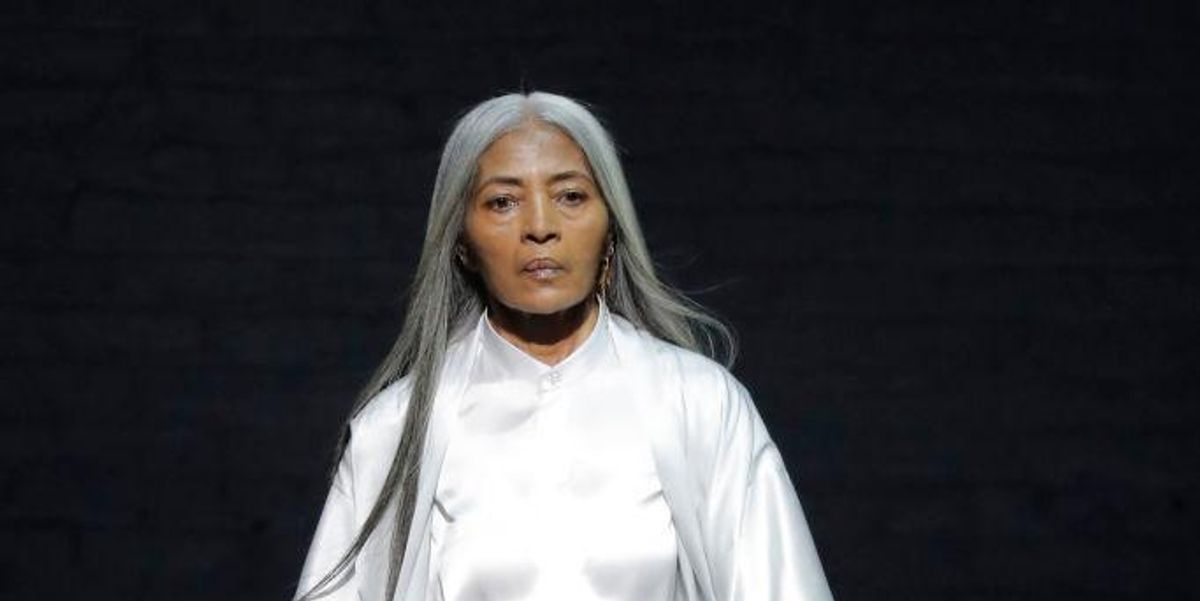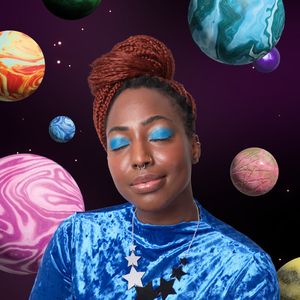
For Model JoAni Johnson Getting Older Isn't A Punishment, Issa Gift
If God blesses me with the opportunity to live 70 years on this earth, I hope that I can be as fly as women like JoAni Johnson while doing so. Black women are living proof that the fountain of youth does, in fact, exist, but sometimes, our age begins to feel less like a number and more like a countdown to the grave, but according to JoAni, getting older isn't a punishment, issa gift. Since going viral in a street style fashion video 2016, the model has been booked and busy, securing a bag from brands like Calvin Klein, CDLM, and Fenty, sending a fashion world a message that this wave of age-inclusion is here to stay.

Although JoAni may seem like she has the confidence of 1,000's Beyoncés, it's both inevitable and totally human to get lost in the comment section from time-to-time. She explained that since her debut in the fashion world, she's received a number of negative comments that can often be overwhelming. She told MadameNoire:
"It is mind-boggling to me when these things come out, my biggest interest is in the comments. I gotta go through and read all the comments, like why? And the only ones that really capture my eye are the negative ones because it's natural."
Sticks and stones ain't got nothing on The Shade Room comment section, and although social media has shown JoAni a lot of love, the model says that she's also seen her share of hate.
"At first, it was hard because no one likes negativity, but, just like everything else, nothing is perfect. There is nobody on this planet that is perfect."
Ultimately, JoAni had to level up her mentality and realize that nobody's perfect, and this especially applies to trolls on the internet who try to steal your joy. Instead of giving into the societal pressures associated with ageism and sexism, and every other -ism you could probably imagine, JoAni says f*ck it:
"I'm ageless, so you can call it whatever you want to, but it doesn't apply to me. I am a person. I am a human being; that's most important to me."
Insecurities are like opinions, everybody has them; And JoAni believes that although we can get lost in the thoughts of others, we have to remember that the only image that really matters is the one we have of ourselves.
At the root of every insecurity is fear of being "too". Maybe you're too inexperienced to start a business, or think you're too old to follow your dreams, but JoAni says that ultimately, the only thing that can stop you from becoming the woman of your dreams is the ability to adapt to change:
"Fear is a mind killer, but you have to embrace your journey, and everybody's journey is different. As we grow, we change our perspectives; we adapt. Whether it's exfoliating your skin, whether it's plucking the eyebrows more, there are so many chances for you to embrace and adapt."
Although JoAni hasn't always been the luxury brand-rocking runway queen that she is today, she's wearing her crown with grace, keeping in mind that she can face any -ism that comes her way. JoAni shares that the real secret to keeping her confidence is 10 is just showing up. After losing her husband two years ago, she admits that her greatest superpower has been her ability to take a set back and keep on slaying:
"For me, confidence comes from showing up for life on a daily basis. Everything I've been through — the good, the bad and the ugly — has prepared me to know that I can handle my next challenge with confidence. Being older gives me the experience of knowing that I've overcome difficult challenges before, like the death of my husband, and that gives me the confidence to face whatever comes next."
According to JoAni, the war wounds she's acquired over the past 67 years are only beauty marks, ones that we should embrace with open arms.
"Young people should welcome new experiences — they help you build on your current abilities and hopefully add new ones. And with that, even more confidence will come."
Read JoAni's full interview with MadameNoire here!
Featured image by JP Yim/Getty Images
- JoAni Johnson Shows Fashion Models Are More Than An Age ›
- JoAni Johnson, 68, Proves Ageless Beauty, Grace, and Power ›
- JoAni Johnson: 67-Year-Old Model Rihanna FENTY | HYPEBAE ›
- JoAni Johnson Started Her Modeling Career At 65 – And Now Stars ... ›
- 68-Year-Old JoAni Johnson Is One Of The Model Rihanna Picked ... ›
- Rihanna Casts 67-Year-Old Model JoAni Johnson In Fenty Campaign ›
- 67-Year-Old Model JoAni Johnson Shares How She Stays Timeless ... ›
- PHOTOS: Rihanna's 67-Year-Old FENTY Campaign Model JoAni ... ›
- JoAni Johnson: The 67-Year-Old Model Rihanna Cast for Fenty ... ›
- Rihanna's Fenty Campaign Stars JoAni Johnson, a 68-Year-Old Model ›
- Fashion Rihanna Handpicked 67-Year-Old Model JoAni Johnson ... ›
- Rihanna's FENTY Model: 5 Things to Know about 68-year-old silver ... ›
Taylor "Pretty" Honore is a spiritually centered and equally provocative rapper from Baton Rouge, Louisiana with a love for people and storytelling. You can probably find me planting herbs in your local community garden, blasting "Back That Thang Up" from my mini speaker. Let's get to know each other: @prettyhonore.
ItGirl 100 Honors Black Women Who Create Culture & Put On For Their Cities
As they say, create the change you want to see in this world, besties. That’s why xoNecole linked up with Hyundai for the inaugural ItGirl 100 List, a celebration of 100 Genzennial women who aren’t afraid to pull up their own seats to the table. Across regions and industries, these women embody the essence of discovering self-value through purpose, honey! They're fierce, they’re ultra-creative, and we know they make their cities proud.
VIEW THE FULL ITGIRL 100 LIST HERE.
Don’t forget to also check out the ItGirl Directory, featuring 50 Black-woman-owned marketing and branding agencies, photographers and videographers, publicists, and more.
THE ITGIRL MEMO

I. An ItGirl puts on for her city and masters her self-worth through purpose.
II. An ItGirl celebrates all the things that make her unique.
III. An ItGirl empowers others to become the best versions of themselves.
IV. An ItGirl leads by example, inspiring others through her actions and integrity.
V. An ItGirl paves the way for authenticity and diversity in all aspects of life.
VI. An ItGirl uses the power of her voice to advocate for positive change in the world.
Let’s make things inbox official! Sign up for the xoNecole newsletter for daily love, wellness, career, and exclusive content delivered straight to your inbox.
When discussing the topic of raising children, discipline is often the first thing that comes to mind. Children need discipline. Full stop. But what is discipline? And how do we draw the line between discipline and revenge?
The origin of the word "discipline" can be traced back to the Latin word "disciplina," which means "instruction" or "teaching." Over time, however, discipline has come to be synonymous with punishment, with parents relying on shame, fear, and/or physical pain to curb undesirable behavior.
Teaching takes time, so nipping it in the bud in whatever fashion parents deem necessary (within reason) has become the norm. But is this what’s best for children? And when does it become less about curbing undesirable behavior and more about getting our licks back for offenses we feel our children should know better to do?
In my work as a parenting coach, I’ve often heard parents say, “I asked him nicely three times before spanking him. He didn’t stop doing it until I did, so clearly talking doesn’t work.”
And the parent isn’t wrong. Talking often doesn’t work the first, the third, or the even the 10th time. And the reason is directly tied to brain development.
Children cannot and do not process information the way an adult can. Auditory processing is not fully developed until a child is 14 or 15 years old. And even then, if a child has auditory processing delays or Auditory Processing Disorder (APD), they may always struggle with processing auditory commands. According to Susie S. Loraine, MA, CCC-SLP, the term auditory processing refers to how the brain perceives and interprets sound information. Several skills determine auditory processing ability—or listening success. They develop in a general four-step hierarchy, but all work together and are essential for daily listening.
Without this understanding, discipline can easily become revenge because parents will then view their child’s misdeeds as a personal slight. Instead of teaching them to do better, parents now want to show them the consequences of not doing better. This is why it's imperative for parents to discern between discipline and revenge to maintain healthy relationships with their children.
5 WAYS TO DISTINGUISH BETWEEN PARENTAL GUIDANCE AND RETALIATION:
Understanding The Intent
Discipline is rooted in love and concern for the child's well-being. It focuses on teaching lessons and helping children understand the consequences of their actions. Conversely, revenge-driven actions stem from a desire to inflict pain or punishment as payback for perceived slights or disobedience. Parents should reflect on their motives before taking disciplinary actions. Ask yourself whether your intention is to help your child learn or to make them suffer for upsetting you.
Example: If a child accidentally breaks a valuable item, a disciplinary response would involve discussing the importance of being careful and working with the child to come up with a way to replace or fix what they’ve broken. On the other hand, a vengeful reaction might involve yelling, harsh punishment, or bringing up past mistakes to intensify guilt.
Maintaining Emotional Regulation
Effective discipline requires parents to remain calm and composed, even in challenging situations. It's natural to feel upset or frustrated when children misbehave, but responding with anger or resentment can escalate the situation and blur the line between discipline and revenge. Before addressing the issue, take a moment to breathe and collect your thoughts.
Example: If a child cannot follow instructions, a disciplined response would involve calmly explaining why their cooperation is necessary in working with the child to accomplish the goal. Conversely, a retaliatory response might involve shouting, name-calling, or resorting to physical punishment out of anger.
Promoting Growth and Learning
Discipline should always aim to promote growth and learning. It involves guiding children toward making better choices and understanding the impact of their actions on themselves and others. Effective discipline strategies include positive reinforcement, setting clear expectations, and providing opportunities for reflection and growth.
Example: If a child repeatedly forgets to complete their chores, a disciplinary approach would involve discussing the importance of responsibility and finding solutions together, such as creating a chore chart or setting reminders with Siri or Alexa. In contrast, a revenge-driven response might involve imposing overly harsh punishments or belittling the child, which can undermine their self-esteem and hinder their ability to learn from their mistakes.

Momo Productions/Getty
Building Trust and Communication
Trust and open communication are essential components of a healthy parent-child relationship. Discipline should strengthen this bond by fostering trust and encouraging children to confide in their parents without fear of judgment or retaliation. When children feel safe and supported, they're more likely to accept discipline as a form of guidance rather than punishment.
Example: If a child admits to breaking a rule or making a mistake, a disciplined response would involve listening to their perspective, discussing the consequences of their actions, and working together to find a solution. Conversely, a retaliatory response might involve accusations, blame, or shutting down communication, which can erode trust and damage the parent-child relationship.
Seeking Professional Guidance
Parenting is a learning journey, and, disciplining children is a delicate balance between guiding them toward responsible behavior and nurturing their growth. By understanding the intent behind our actions, maintaining emotional regulation, promoting growth and learning, building trust and communication, and seeking professional guidance when needed, as parents we can help our children built on love, respect, and understanding.
Let’s make things inbox official! Sign up for the xoNecole newsletter for love, wellness, career, and exclusive content delivered straight to your inbox.
Featured image by Courtney Hale/Getty Images









